Krill is key in the world of aquatic life, providing vital nutrients to fish. It’s packed with nutrients that many marine animals rely on. This makes krill essential for fish health and growth.
This article will look into why krill is so important for fish. We’ll explore its benefits and how it helps fish thrive. Understanding krill’s role in fish food shows how it keeps the marine ecosystem balanced.
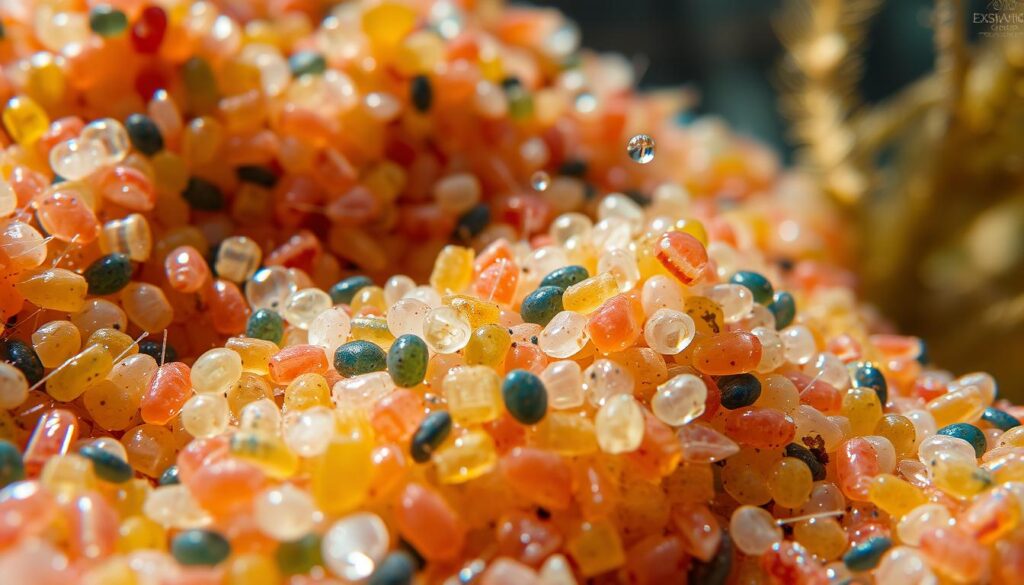
Understanding Krill: A Marine Marvel
What is krill? These small crustaceans live in the cold waters of the Antarctic and North Pacific Oceans. They belong to the order Euphausiacea. Krill are key to marine ecosystems.
Their pink color and long bodies make them stand out. They gather in huge swarms, sometimes with millions of krill. This creates a breathtaking sight in the ocean.
Krill go through different stages from eggs to adults. They eat phytoplankton, using special appendages to catch tiny plants. This makes them a vital food source for many fish, including salmon and mackerel.
Krill are packed with proteins, omega-3 fatty acids, and antioxidants. These nutrients help krill survive and are great for fish too. The omega-3s in krill boost fish health, helping them grow and reproduce better. Krill are crucial for keeping the ocean’s ecosystems in balance.
The Role of Krill in Aquatic Ecosystems
Krill are key in aquatic ecosystems, being a main food for many marine animals. They help keep the marine environment balanced. These small crustaceans feed not just small fish but also big predators like whales and seabirds.
Many fish depend on krill for food. This shows how marine life is connected. If krill numbers drop, it could harm fish and other sea creatures. This could also affect the health of our oceans.
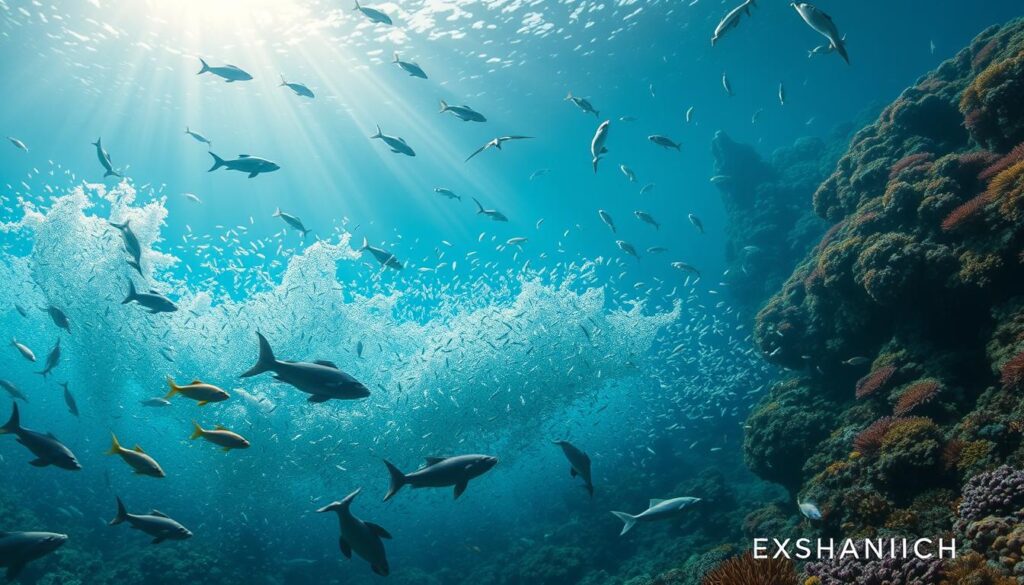
Krill are a keystone species, crucial for the marine ecosystem’s stability. Their role shows a complex web of life. Keeping krill populations healthy is vital for our oceans’ future.
What is Krill in Fish Food – Aquatic krill feeding habits in fish
Krill is key in the diet of many fish. It’s a main food source, especially for fish in cold waters. These small crustaceans give fish energy and important nutrients for growth.
The way fish eat krill is interesting. Fish like mackerel and salmon hunt krill. Krill is a big part of their diet, affecting their health and behavior in the ocean.
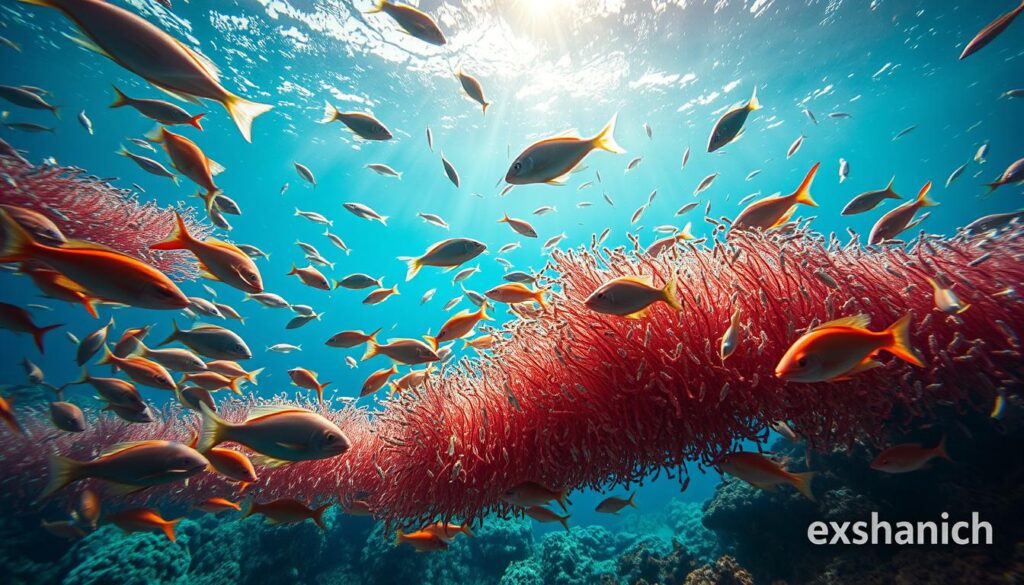
Knowing how important krill is helps keep the ocean healthy. Fish need krill to survive and stay healthy in the sea. Eating krill helps fish live longer in their natural homes.
| Fish Species | Krill Diet Share (%) | Growth Impact |
|---|---|---|
| Mackerel | 45 | Excellent |
| Salmon | 60 | Very Good |
| Tuna | 30 | Good |
| Herring | 50 | Good |
Studying fish diets shows how vital krill is. It’s crucial for keeping fish populations healthy and helping them grow well.
Krill Benefits for Fish Nutrition
Looking into the krill nutritional value for fish shows its key role as a dietary supplement. Krill is a rich source of nutrients that boost fish health and growth. Adding krill to fish diets improves their well-being.
Nutritional Value of Krill for Fish
Krill is packed with omega-3 fatty acids, crucial for healthy tissues and heart health in fish. It also has essential amino acids and vitamins, making it perfect for fish feed. Krill’s nutrient density is key for fish growth and energy.
Importance of Krill in Fish Health
The benefits of krill in fish diet extend beyond nutrition. Krill boosts reproductive health and strengthens the immune system, helping fish fight diseases. The krill role in fish health is significant, with krill-fed fish showing better survival rates and health.
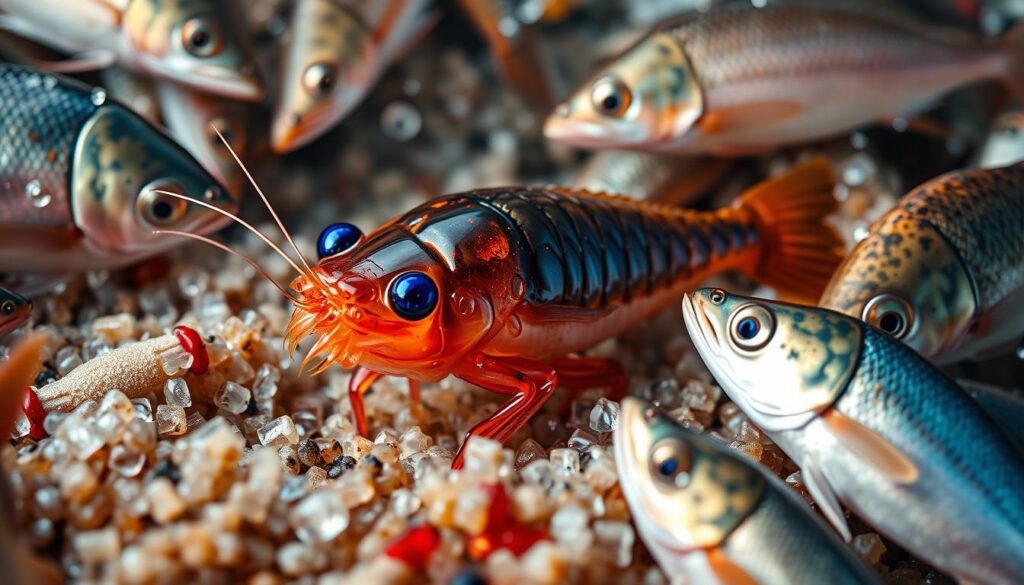
| Nutrient | Benefit |
|---|---|
| Omega-3 Fatty Acids | Supports heart health and reduces inflammation |
| Essential Amino Acids | Promotes muscle growth and repair |
| Vitamins | Enhances immune response and overall health |
| Antioxidants | Protects against oxidative stress |
Adding krill to fish diets meets their nutritional needs and boosts their health and vitality.
Types of Krill Used in Fish Feed
In aquaculture, different types of krill in fish feed are key for better fish nutrition. Knowing about these types can greatly help fish health and growth. There are three main types: whole krill, krill meal for fish, and krill oil for fish. Each has its own benefits for fish nutrition.
- Whole Krill: Whole krill is packed with fatty acids, proteins, and antioxidants. Its natural form is easy for fish to digest, providing vital nutrients.
- Krill Meal: Krill meal is a fine powder that boosts nutrients. It’s mixed with other feeds to increase protein and taste.
- Krill Oil: Krill oil is rich in omega-3 and omega-6 fatty acids. It helps fish grow faster and stay healthier.
Krill harvesting must be done sustainably. Ethical practices keep krill populations healthy and support the ocean. Choosing sustainable krill products helps fish farms raise healthier fish.
How Krill Enhances Fish Growth and Development
Krill is a key natural food for fish, helping them grow and develop well. Studies show that adding krill to fish diets boosts their health and growth. It does this through many nutritional benefits.
Krill as a Natural Protein Source
Krill is a great protein source for fish, giving them the nutrients they need to grow. Fish eating krill-rich diets grow faster and are healthier. This is because krill helps in muscle growth and boosts the immune system, making fish more resistant to diseases.
Impact of Krill on Fish Feeding Behavior
Research shows that krill makes fish more eager to eat and forage. This leads to better nutrient absorption and growth conditions. Fish become more active and prefer krill-enriched diets, showing its positive effect on their natural feeding habits.
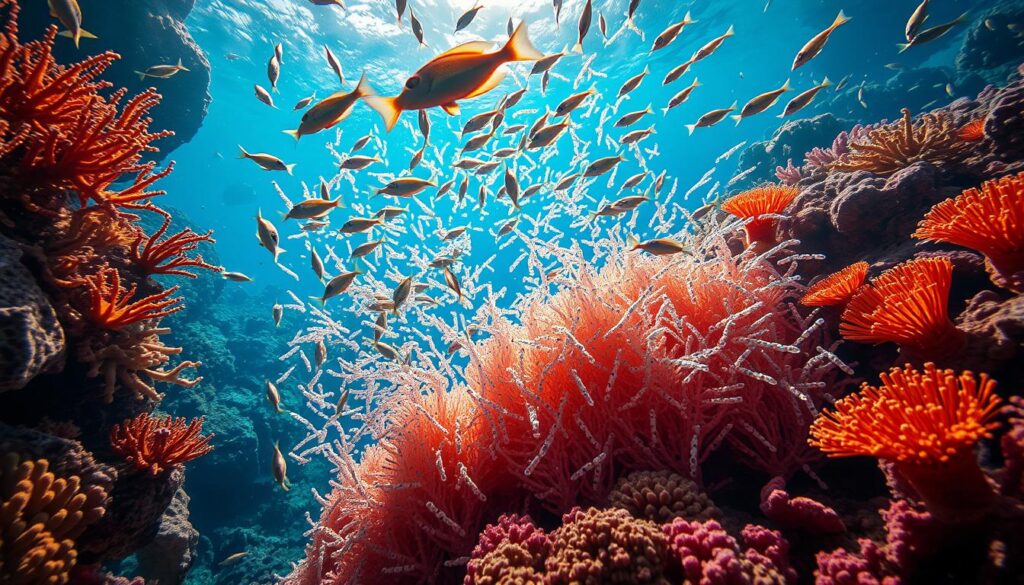
| Nutritional Aspect | With Krill | Without Krill |
|---|---|---|
| Protein Content (%) | 58 | 30 |
| Feed Conversion Ratio | 1.2 | 1.8 |
| Growth Rate (g/week) | 12 | 8 |
| Disease Resistance | High | Moderate |
Krill’s benefits are key to fish growth and feeding behavior. This leads to healthy and thriving aquatic environments.
Krill Supplements: A Boost for Aquatic Species
Krill supplements for fish are gaining popularity in aquaculture. They offer health benefits and come in forms like powders and oils. This makes it easy to add them to fish food, boosting its nutritional value.
These supplements do more than just feed fish. They help fish fight off diseases and stress better. Studies show that fish grow faster and eat better when they get krill supplements.
Adding krill to fish food also makes it more appealing to fish. The natural flavors and omega-3 fatty acids in krill attract fish. This leads to healthier and more active fish, which is great for aquaculture.
Conclusion
Krill is very important for fish feeding. It’s small but packed with nutrients that help fish grow and stay healthy. Krill has proteins, omega-3 fatty acids, and vitamins that are key for fish development.
Krill also helps fish farming in big ways. It makes farming more sustainable and improves the quality of fish. Studies keep showing how important krill is for fish and for keeping our oceans healthy.
We need to make sure we get krill in a way that’s good for the ocean. This helps protect marine life and supports sustainable fishing. Using krill wisely is a step towards a better future for our oceans.
FAQ
What is krill, and why is it important in fish food?
Krill are small crustaceans that are vital in marine ecosystems. They are packed with proteins, omega-3 fatty acids, and vitamins. This makes them a top choice for fish food.
What are the benefits of incorporating krill into fish diets?
Adding krill to fish diets boosts their growth and immune system. It also improves reproductive health and disease resistance. All these benefits contribute to better fish health.
How do fish consume krill in their natural habitats?
Fish use different ways to eat krill, like filter feeding or active hunting. Krill is a key part of many fish diets. It links them to health and survival.
What types of krill are commonly used in fish feed?
Common krill forms in fish feed are whole krill, krill meal, and krill oil. Each type has unique nutritional benefits. They are chosen based on the fish’s dietary needs.
How does krill impact fish growth and development?
Krill is a natural protein source that boosts fish growth. Using krill in feed improves growth rates and feed efficiency. This leads to better growth and higher yields in aquaculture.
What are krill supplements, and how are they beneficial for fish?
Krill supplements, like powders and oils, enhance fish health and performance. They boost immune response and growth rates. This results in better health for aquatic species.
Can you explain the nutritional value of krill for fish?
Krill is known for its nutritional value. It has essential amino acids, omega-3 fatty acids, and antioxidants. These nutrients are vital for fish growth, development, and health.
What role does krill play in marine food webs?
Krill is a key food source in marine food webs. It supports fish and other marine creatures like whales and seabirds. It’s crucial for maintaining ecological balance.

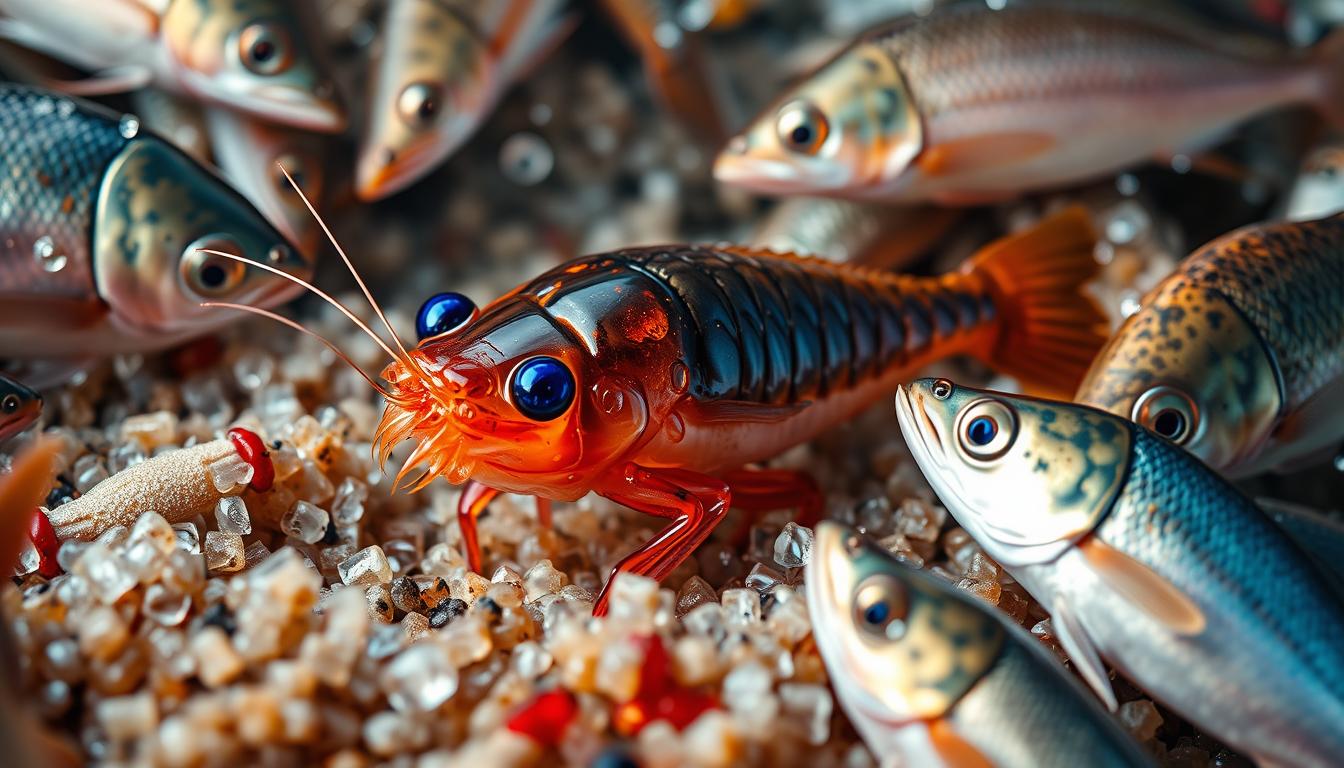


 No products in the cart.
No products in the cart.